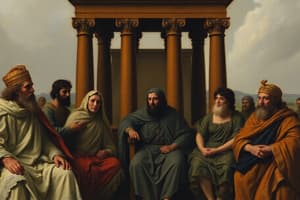Podcast
Questions and Answers
During the Pax Romana, how many years of relative peace did the Roman Empire experience?
During the Pax Romana, how many years of relative peace did the Roman Empire experience?
- 300 years
- 206 years (correct)
- 100 years
- 50 years
What was the Roman diet based on?
What was the Roman diet based on?
- Meat, dairy, and vegetables
- Grain, grapes, and olives (correct)
- Bread, cheese, and wine
- Fish, rice, and beans
What was the purpose of the public baths in the Roman Empire?
What was the purpose of the public baths in the Roman Empire?
- To get clean and relax (correct)
- To exercise and socialize
- All of the above
- To drink special mineral waters
Flashcards are hidden until you start studying
Study Notes
Life in the Roman Empire: Social Classes, Patriarchy, Diet, Clothing, and Public Baths
- During the Pax Romana, the Roman Empire experienced 206 years of relative peace.
- The quality of life in the Roman Empire varied greatly depending on a person's social class.
- The wealthy lived in huge, well-decorated houses with servants or slaves, while the average citizen lived in modest housing, and the largest class of people were poor and lived in poverty.
- The patriarch or paterfamilias held considerable power over the family, and the family system was patriarchal, meaning that men held total power, and that power could only be passed between men.
- The Roman diet revolved around three Mediterranean foods: grain, grapes, and olives, which were eaten daily by everyone.
- The rich enjoyed exploring new flavors and trying strange foods, while the poor relied on bread, vegetables, and porridge for their meals.
- Only citizens were allowed to wear the toga, which was a sign of social class, and the average citizen wore a white toga, while a person in a position of importance wore a toga with a purple stripe.
- The public baths were places where men and women (separately) could go to socialize, exercise, read, relax, and get clean.
- The typical trip to the public baths included exercise in the gymnasium, a visit to a warm room where an attendant would rub oil all over the visitor's body, and a swim in hot and cold water pools.
- The waters of the public baths were continuously refreshed by aqueducts and heated by underground furnaces, and visitors drank special mineral waters believed to have healing powers.
- The patriarch had the power to leave his wife, or even kill her if she cheated on him, and could even kill his own children, deciding if a newborn baby should live and be raised by the family.
- Women could not be politicians, but they gained more rights in later years of the empire, including the right to own property.
Studying That Suits You
Use AI to generate personalized quizzes and flashcards to suit your learning preferences.




